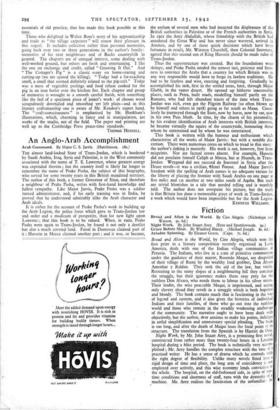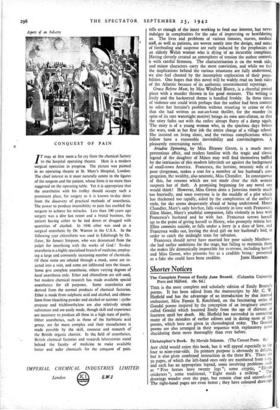Fiction
Night Work. By John Stuart Arey. (Eyre and Spottiswoode. 9s.) Grace Before Meat. By Winifred Blazey. (Michael Joseph. 8s. 6d.) Ariadne Spinning. By Eleanor Green. (Cape. 7s. 6d.) Broad and Alien is the World, by Ciro Alegria, which won the first prize in a literary competition recently organised in Latin America, deals with one of the Indian village communities Of Peruvia. The Indians, who live in a state of primitive communism under the guidance of their mayor, Rosendo Maqui, are despoiled of their village of Rumi by the wealthy land grabber, Don Alvaro Arnenbar y Roldan. They seek the aid of the law, but vainly. Retreating to the stony slopes of a neighbouring hill ;hey continue the struggle, but their ignorance makes them easy prey for the ruthless Don Alvaro, who needs them to labour in his silver mines. Their leader, the wise peaceable Maqui, is imprisoned, and seeing only slavery ahead they revolt in a struggle which is both hopeless and bloody. The book contains much that is fascinating in the wa of legend and custom, and it also gives the histories of -individua: Indians and their families, of those who go- out into the ruthless world and those who remain in the steadily weakening anchorage of the community. The narrative ought to have been dealt with objectively, but the author, aver anxious to make his points, indulges in artful simplification and unnecessary special pleading. The book is too long, and after the death of Maqui loses the focal point of its structure. The translation from the Spanish is by Harriet de Onis. Night Work, by Mr. John Stuart Arey, is-a promising first novel, constructed from rather more than twenty-four hours in a London hospital during a blitz period. The book is technically very accom- plished • Mr. Arey handles the complex structure with the ease of 3 practised writer. He has a sense of drama which he controls with the right degree of flexibility. Unlike many novels fitted into 2 rigid design of time and place, the long arm of coincidence is not employed over actively, and this wise economy lends conviction to the whole. The hospital, on the old-fashioned side, in spite of war- time conditions and shortness of staff, runs with the dexterity of a machine. Mr. Arey realises the fascination of the unfamiliar: he tells us enough of the inner working to feed our interest, but never indulges in complexities for the sake of impressing or bewildering us. The lives and problems of various inmates, nurses, medical staff, as well as patients, are woven neatly into the design, and notes of foreboding and suspense are early induced by the prophecies of an elderly Welsh woman who is dying of an incurable complaint. Having cleverly created an atmosphere of tension the author controls it with careful firmness. The characterisation is on the weak side, and minor characters carry the most conviction, and while we feel the implications behind the various situations are fully understood, we also feel cheated by the incomplete exploration of their possi- bilities. One hopes that this novel will be widely.read on both sides of the Atlantic because of its authentic unsentimental reportage.
Grace Before Meat, by Miss Winifred Blazey, is a cheerful period piece with a murder thrown in for good measure. The writing is lively and the hackneyed theme is handled freshly. In these times of violence one could wish perhaps that the author had been content to solve her heroine's problem without resorting to crime or else that she had written an out-anti-out thriller, for the murder (in spite of its rare watertight motive) brings its own anti-climax, so that the story fades out with the rather abrupt flurry of a damp squib. The story is of a young woman who, in the spacious days before the wars, took as her first job the entire charge of a village school. She insisted on living alone, and the various complications which follow have a reasonable inevitability and convincingness. A pleasantly entertaining novel.
Ariadne Spinning, by Miss Eleanor Green, is a much more pretentious affair, and readers familiar with the tragic and classic legend of the daughter of Minos may well find themselves baffled by the intricacies of this modern labyrinth set against the background of small-town America. Francesca, the heroine, neurotic wife of a poor clergyman, makes a coat for a member of her husband's con- gregation, the wealthy, also neurotic, Miss Chandler. In consequence of this, for reasons which are not made clear the rich woman suspects her of theft. A promising beginning for any novel one would think! However, Miss Green dons a Jamesian mantle much too hurriedly, and soon everyone is in the muddle of a plot which has thickened too rapidly, aided by the complexities of the author's style, for she seems desperately afraid of being understood. Henry Chandler, Mary's only brother, falls violently in love with Francesca ; Ellen Maier, Mary's youthful companion, falls violently in love with Francesca's husband and he with her. Francesca screws herself up to the point of giving herself to Henry, who promptly rejects her. Ellen commits suicide, or falls under a lorry in a daze of love, and Francesca walks out, leaving the dead girl on her husband's bed, in order to catch the midnight train for salvation.
Francesca should never have married her poor saintly Matthew: she had earlier ambitions for the stage, but failing to maintain them she makes life dramatically impossible for everyone, including herself and Miss Green, who presents her as a credible being : presented as a fake she could have been credible. JOHN HAMPSON.



























 Previous page
Previous page